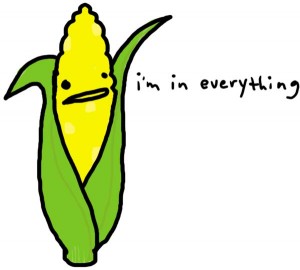I finished reading Michael Pollan’s the Omnivore’s Dilemna recently. Given that it’s all about food, it was surprisingly thought provoking on its implications on serving the un- and underbanked. Even without a mention of prepaid cards, payday loans or second-chance checking accounts. It’s about the challenges – and importance – of scaling idealism.
Pollan argues that because humans can eat just about anything, it forced the development of our brain so that we could differentiate the poison oak from the butter lettuce (whereas the bamboo-only diet has left the panda with a tiny noggin).
 With perverse delight, Pollan paints the many ways in which the food industrial complex has driven America to obesity, our cows to forgo grass, and our land to erode as monoculture. Still, corn feeds billions. In my parallel universe, these are the mainstream financial institutions. Driven by greed, they have driven America to debt, our children to forgo savings, and ratings agencies to corrupt. Still, banks are the backbone to the global economy.
With perverse delight, Pollan paints the many ways in which the food industrial complex has driven America to obesity, our cows to forgo grass, and our land to erode as monoculture. Still, corn feeds billions. In my parallel universe, these are the mainstream financial institutions. Driven by greed, they have driven America to debt, our children to forgo savings, and ratings agencies to corrupt. Still, banks are the backbone to the global economy.
He then describes how the ’60s idealists in Berkeley formed the basis of the American organic food movement. It has borne hundreds of sustainable farms, organic food stores and local-food restaurants across the US. Pollan chronicles this movement with deserved love and respect. I liken it to the community development movement, also born in the idealistic ’60s, also proliferated into hundreds of incredible organizations, such as ShoreBank and Self-Help Credit Union, which provide financial services to poor people and underserved communities. However, neither movement serves 1% of America! While good and important, both are niche at best.
Enter Whole Foods: The organic food chain that sold its soul to the devil, yet brought the organic food movement to scale, if I may simplify Pollan’s drift. On one hand, Whole Foods and especially its CEO, John Mackay, has become a lightning rod for the purists. They don’t source locally, they ship strawberries from Chile, they put independents out of business. And worse, Mackay hates unions and opposed the Obama health care reform. Whole Foods, I agree, has compromised a lot of values we attribute to the organic food movement. However, without Whole Foods neither Wal-Mart nor Costco would be selling organic. Without Whole Foods millions of acres would not be harvested without chemicals or pesticides.
Who is to the community development movement what Whole Foods is to the organic movement? Who can take ShoreBank to a meaningful scale? How can tens of millions of people reap the benefit of their vision, their practices and their values? Us economic development-types are at risk of putting too much stock into too few results. I believe it is NOT ok to only serve a couple hundred or a couple thousand people, as many who care about the welfare of the un- and underbanked are willing to do. Not if we want to address a national issue that impacts 60 million people.
The luxury of small makes it very easy to be critical of the large: “banks this,” and “payday that.” I want to see leaders like John Mackay in financial services. True, profit-hungry capitalists who are also deeply driven to realize a larger vision for a better world. Pragmatic idealists, where are you? Send me your favorites at arjan@corevc.com.